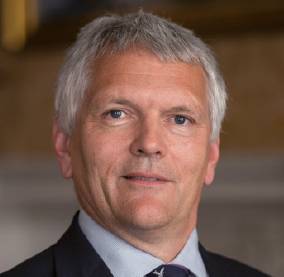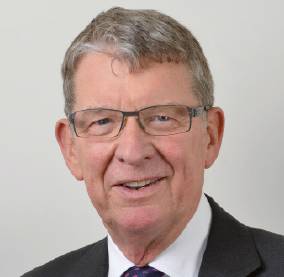Message from RAeS
Message from RAeS
 It was very sad to learn of the death of His Royal Highness The Prince Philip. As a keen pilot and supporter of aviation, science and technology, industry and young people, the Duke will have influenced many Society members’ lives. He made a substantial contribution to our community. Awarded an Honorary Fellowship in 1954, Prince Philip was the Society’s Honorary President during our centenary in 1966 and chaired the Society’s 1,000th Council meeting in 1990. In 1976 he initiated the Fellowship of Engineering, now the Royal Academy of Engineering, which promotes engineering excellence and education, and was also Chair of the Originating Committee for The Queen’s Award for Industry, as it was then known. His passion for aerospace and encouragement of young people will be missed by us all.
It was very sad to learn of the death of His Royal Highness The Prince Philip. As a keen pilot and supporter of aviation, science and technology, industry and young people, the Duke will have influenced many Society members’ lives. He made a substantial contribution to our community. Awarded an Honorary Fellowship in 1954, Prince Philip was the Society’s Honorary President during our centenary in 1966 and chaired the Society’s 1,000th Council meeting in 1990. In 1976 he initiated the Fellowship of Engineering, now the Royal Academy of Engineering, which promotes engineering excellence and education, and was also Chair of the Originating Committee for The Queen’s Award for Industry, as it was then known. His passion for aerospace and encouragement of young people will be missed by us all.
It has been an absolute honour to have been the President of the Royal Aeronautical Society. When I took up the role in May 2019, I thought that Brexit would provide the major challenge to our sector, and of course there are still issues to be resolved (for example with the UK’s access to EGNOS Safety of Life Service). It is worrying to see reports that the UK government is likely to miss its target R&D spend. A gap between allocations and commitments will have a big effect on research programmes, and the associated technical expertise and jobs across the UK aerospace industry, that can’t simply be put ‘on ice’ to be continued at a later date.
Little did I know that, in footballing parlance, I was going to have an extended presidency of two halves, with the past 12 months being very much dominated by the Covid pandemic. Not only has there been much hardship and loss at a personal level but the effects across our community, and the Society itself, have been immense. The Society and its membership have responded fantastically to the challenge and I am proud to see how all our activities have continued to function and that we continue to support our entire membership. I am sure that the RAeS will prosper once we move out of lockdown.
There were many instances of Society members and Corporate Partners responding to the pandemic. Examples included: Airbus flying shipments of face masks across Europe, ‘Project Wingman’ setting up mini-airport lounges for hospital staff and many companies, universities and individuals using their facilities and expertise to design and manufacture ventilators and PPE. It was a particular pleasure to bestow the second ever President’s Award to the VentilatorChallenge UK Consortium in recognition of their achievement and contribution to the fight against Covid-19.
Our international reach continues to expand, with a representative organisation established in China, the inaugural meeting of the RAeS Singapore Branch Student Chapter and an MoU signed with the AIAA. There has been a much closer interaction with our accredited universities. Several academic forums were held, enabling HEI staff to share best practice in these strange times and also for the RAeS to share resources and accreditation guidance.
The move towards virtual delivery has had some positive consequences. We have maintained our conference and lecture programme using our enhanced digital capability, providing an improved offering to our members. Attendance for Society and Branch lectures is much greater and I have been able to attend many events hosted by our Specialist Groups and local Branches worldwide. For the first time all Divisional Presidents have been able to participate in Council meetings. Other highlights for me include: the award of Best PEI Prize in the Engineering Talent Awards, presenting the first Sir Ralph Robins Medal, being a signatory to the Society’s Black Lives Matter statement, introducing the inaugural Mary Jackson Lecture and attending the NAL garden party on a hot June afternoon what seems a lifetime ago.
I would like to thank the volunteers who tirelessly support RAeS activities via the local Branches, Specialist Groups, Corporate Partners and our many boards and committees. The Society is defined by its membership and I am constantly impressed by our many devoted members. It was a pleasure to meet some of you during my term of office. Further thanks also need to go to the Society staff, led by Sir Brian Burridge, Council and the Board of Trustees, without whom the RAeS would not function and for their support of my presidential term. I have no doubts that the incoming President Howard Nye is going to make a great success of his year in office. I hope that he finds the experience as rewarding as I have and wish him all the very best.
Very early in my presidency, I spent an enjoyable two-day visit hosted by the Hamburg Branch. On the second morning, the plan was for me to catch a ferry across the Elbe and then get a lift to my first appointment. Unfortunately, I missed the ferry but I didn’t have the contact number of the person I was meeting. Hamilton Place reputedly received a somewhat panicky phone call saying that the President had been lost. The past two years might have been very different!
Sir Brian Burridge
 - With the very poignant funeral of HRH The Prince Phillip executed with great precision still sharp in our memories, it is fitting that we pay tribute to his contribution to the Society over almost seven decades. The president rightly records this through the engineering lens but His Royal Highness was also a gifted and avid aviator. With 65 types in his logbook, he flew civil aircraft from the Constellation to Concorde, military aircraft from the Vampire to the Vulcan and helicopters from the Whirlwind to the Apache. This wide experience fuelled his curiosity and made him an authority on the Society’s areas of interest, not least in encouraging young people to recognise the excitement and professional satisfaction inherent in flying (see article: Celebration of Life).
- With the very poignant funeral of HRH The Prince Phillip executed with great precision still sharp in our memories, it is fitting that we pay tribute to his contribution to the Society over almost seven decades. The president rightly records this through the engineering lens but His Royal Highness was also a gifted and avid aviator. With 65 types in his logbook, he flew civil aircraft from the Constellation to Concorde, military aircraft from the Vampire to the Vulcan and helicopters from the Whirlwind to the Apache. This wide experience fuelled his curiosity and made him an authority on the Society’s areas of interest, not least in encouraging young people to recognise the excitement and professional satisfaction inherent in flying (see article: Celebration of Life).
- As anticipated, the three follow-on publications to the Integrated Review covering the detail of defence posture, industrial strategy and the MoD’s approach to climate change, have all added considerable texture. It is striking that there is now strategic convergence between defence and civil interests in areas, such as science and technology, research and development and in space. This is underpinned by a more pragmatic approach to the importance of on-shore, end-to-end capability in a range of segments from complex weapons through shipbuilding, combat air, rotary and space. There is also recognition of the value of defence manufacturing to the economy. In terms of air power, the matter of F-35 numbers remains unresolved: Typhoon and Tempest get additional funding but perhaps at the expense of a hollowing-out of surveillance capability, at least until the creation of a constellation of satellites fills the gap. More detail will come in next month’s AEROSPACE.
- While more defence satellites might be welcome, space is becoming very crowded. Earlier in April, a SpaceX and OneWeb satellite came perilously close to colliding, missing each other by little more than 50 metres. Apart from their potential destruction, the collateral damage from the subsequent debris would have been enormous. Having run a related conference last year, the Space Specialist Group is taking steps to increase awareness of these hazards. More broadly, this issue of AEROSPACE is dedicated to space as a precursor to the incoming President’s Space Conference, ‘UK in the 2020s – An Emerging Space Power’ on 19-20 May. This is a rich topic given the rapidly expanding market and the Integrated Review’s focus on space. So, if your interest has been kindled by this magazine, do register and join the impressive range of international speakers.
- On the careers front, the new Career Flightpath platform has got off to a great start with hundreds of users doing career assessments, e-learning courses and honing CVs. The platform is free, as is our ongoing personalised 1-2-1 advice from our dedicated careers team. Also, the team is holding a ‘one-year-on’ Careers Support and Advice virtual afternoon on 5 May with expert panellists from the 2020 event returning to give updates and advice as the impact of the pandemic continues. There will be other guest speakers and a ‘meet the Careers team’ open room. For more information contact careers@aerosociety.com.
- We have also partnered with World Skills UK to support the UK Aero Mechanical Competition 2021. The competition offers a tremendous opportunity for aerospace maintenance apprentices to demonstrate their knowledge and practical engineering skills and win a place in the national competition. Registration is open until 19 May. Please contact Rishi Radia in the Careers team if you would like more information. Also, our young member video competition AeroTube is now open for submissions. We are asking young members to show off their creative skills and share their knowledge by producing an informative video on an aerospace or aviation-related topic. The competition closes 31 May 2021, for more information contact YPN@aerosociety.com.
- As you read this, there is less than a week left in which to vote in the 2021 Council election. Meanwhile, members should have received their log-in details from Lumi to join the Society’s Special General Meeting and the Annual General Meeting which takes place on the 6 May 2021 at 1100 (BST). Members will be aware that, after the formal business of the AGM, we will mark the presidential handover. I should like to place on record our thanks to Professor Jonathan Cooper who has so generously given of both his time and his wisdom over an extended period of two years. An extremely active president but also with a busy and responsible day job, Jonathan has represented the Society at numerous real and virtual events, maintained engagement with the Branches and Specialist Groups and made a success of chairing virtual Council meetings. The Society is grateful for Jonathan’s contribution, commitment and flexibility during this exceptional and unprecedented time.
Announcement on the retirement of the RAeS CEO
After more than 50 years in the aerospace and defence sector and three years as Chief Executive Officer of the Royal Aeronautical Society, Sir Brian Burridge has indicated to Trustees that he intends to retire from his post in October of this year.
The Trustees are considering the appropriate recruiting strategy by which to appoint a replacement and, over this time, there will be greater opportunity to thank Sir Brian more fully for his excellent and valued contribution to our sectors.